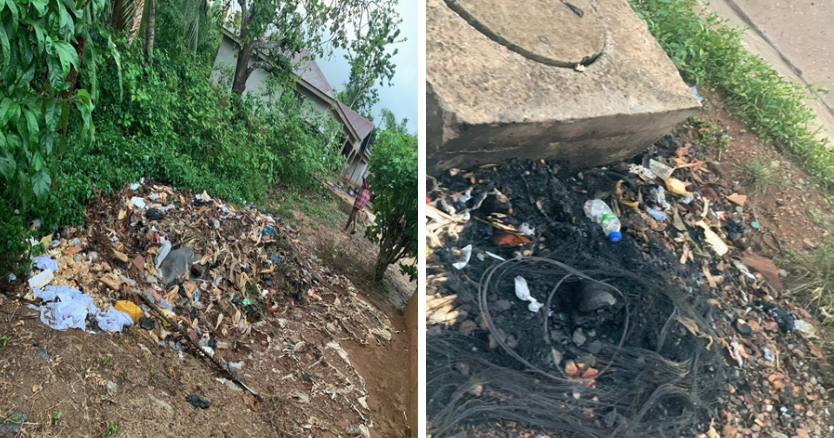Written By: Esther Eyiram Kportimah.
Improper household solid waste management is one of the main environmental pollutants worldwide and a serious problem faced in our time. Effective solid waste management is essential for achieving Sustainable Development Goal 12, which focuses specifically on sustainable consumption and production. SDG 12 aims to substantially reduce waste generation through prevention, reduction, recycling, and reuse.
Solid waste is defined as any type of garbage, trash, refuse, or discarded (World Health Organization, 2022). Solid waste generation has increased rapidly around the world and there is no evidence of slowing down due to the lack of recycling and waste management infrastructure in most parts of the world, increasing population, changes in consumption patterns and lifestyle, and economic growth in most countries. By 2050, worldwide municipal solid waste generation is expected to have increased roughly 70 percent to 3.4 billion metric tons (Statista, 2023). Also, a report published in 2018 by the World Bank titled “What a Waste 2.0” indicated the generation of 2.01 billion tonnes of Municipal Solid Waste (MSW) worldwide in 2016. The recycling of the household solid waste in Africa varies greatly from country to country and even within different regions of the same country. However, it is generally true that the recycling rates in Africa are relatively low compared to other regions of the world. According to the United Nations Environment Programme (UNEP), the average recycling rate for municipal solid waste in Africa is only 4%.
Implications of ineffective solid waste management
This implies that the vast majority of household solid waste in Africa is not being recycled, but rather burnt and or disposed of in landfills or dumped openly. This is no different in Ghana, especially Lower West Akim Municipality. The majority of solid waste generated by households in the municipality is burnt and disposed of openly.
There are policies for household waste management in Ghana that aim at promoting sustainable waste management practices, reducing the amount of waste generated, increasing the amount of waste that is recycled, and improving public health and sanitation. These policies include The National Environmental Sanitation Policy (NESP) which aims to provide guidelines for the management of solid waste in Ghana. The policy provides for the establishment of an integrated waste management system that includes waste reduction, reuse, and recycling. The Environmental Sanitation Policy and Strategy (ESPS) focuses on improving environmental sanitation in Ghana. However, there is still a need for more effective implementation and enforcement of these policies to achieve their intended outcomes. Inadequate infrastructure and resources, lack of proper waste management systems, lack of education, and inadequate waste disposal sites are some of the reasons for poor waste management in the municipality. Improper household solid waste management may result in environmental pollution, the spread of diseases, climate change, and loss of lives amongst others.
Picture 1-2: Household waste disposed of openly and burnt.

Photo by: Esther Kportimah Eyiram, 30th March 2023 at Brekumanso in the Lower West Akim Municipality, Ghana.
Household solid waste management which refers to the practices, methods, and systems employed by households to handle, dispose of, and recycle solid waste generated in their homes is essential for environmental protection as well as public health. To reduce environmental pollution resulting from improper waste management at household levels and maintain a clean and healthy living environment, the following methods proposed by the (United Nations Environmental Protection Agency, 2022) can be used;
- Reduction in waste generation through practicing responsible consumption and avoiding over-packaged goods.
- Segregate waste into categories such as biodegradable, non-biodegradable, and hazardous waste to make the disposal process easier and safer. Biodegradable waste can be composted, while non-biodegradable waste can be recycled.
- Recycling non-biodegradable waste such as plastic, glass, and metal can significantly reduce the amount of waste sent to landfills. Households can use recycling bins or take the waste to a recycling center.
- Composting is a natural process of breaking down biodegradable waste which may enrich soil fertility.
Effective household solid waste management requires combining efforts of public education, infrastructure development, and policy implementation. Governments, NGOs, private organizations, and individuals are encouraged to help promote proper waste management at the household level and participate in the establishment of waste management systems in the country. These collective efforts will contribute to providing a more serene environment free of pollution, and diseases, and safe for mankind.
References
Hoornweg, D., Bhada-Tata, P., & Kennedy, C. (2013, October 30th). Environment: Waste production must peak this century. Retrieved April 2023, from Nature.com: https://doi.org/10.1038/502615aPariatamby, A., & Victor, R. (2018). Household solid waste management in developing countries: an overview. Retrieved April 4th, 2023, from https://doi.org/10.1007/978-3-319-79066-9_4
Statista. (2023, February 8th). Global waste generation - statistics and facts. Retrieved March 29th, 2023, from statista.com: https://www.statista.com/topics/4983/waste-generation-worldwide/#topicOverview
The World Bank. (2018). What a waste2.0 - A Global Snapshot of Solid Waste Management to 2050. Retrieved March 29th, 2023, from The World Bank: https://datatopics.worldbank.org/what-a-waste/
United Nations Environmental Protection Agency. (2022, July 5th). Epa.gov. Retrieved April 4th, 2023, from United Nations Environmental Protection Agency: https://www.epa.gov/smm/sustainable-materials-management-non-hazardous-materials-and-waste-management-hierarchy
Wilson, D. C., Velis, C., Cheeseman, C. R., & Nemerow, N. L. (2018, December 7th). Distribution and Sources of Hydrocarbon Compounds in Sediments from Obhur Lagoon: Red Sea Coast of Saudi Arabia. Retrieved April 4th, 2023, from https://doi.org/10.1007/978-3-319-99417-8_8
World Health Organization. (2022). Guidance on solid waste and health. Retrieved March 29th, 2023, from World Health Organization: https://www.who.int/tools/compendium-on-health-and-environment/solid-waste#:~:text=Solid%20waste%20refers%20to%20any,solid%20waste%20are%20produced%20annually.